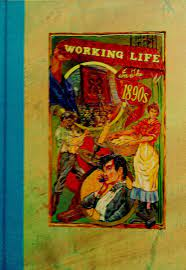Ok the time has come for a little more about working life in Australia during the 1890's. Remember way back then there was no state welfare so the strike caused a lot of heartache and poverty among the workers and their families.
The only “dole” was from the unions funds but that ran out pretty quick, this meant people were evicted due to non payment of rent. Also of course no money meant that they couldn't purchase food and then there was skyrocketing prices of goods.
Families of the unemployed approached charities such as the Melbourne Ladies Benevolent Society but their resources were limited and the strikers families were often seen as undeserving. It wasn't uncommon for the wives of the striking men to fine their request for help refused.
It is part of the legend of the 1890's that the strikes were the catalyst through which the Australian Labour Party emerged. However, there was already some representation of workers in parliament. In March 1891 the Sydney Trades and Labour Council planned the platform and rules of the Labour Electoral Leagues Candidates were endorsed with 45 standing for election in NSW Legislative Assembly in June. Out of which 36 were returned and Labour held the balance of power for the first time in Australian politics.
Social problems continued, however, in Melbourne with great numbers of people unemployed. The Melbourne Ladies Benevolent Society minutes of July 1892 recorded the problems of a Walsh family from Collingwood in Melbourne. The father a labourer lost his job and the family was supported by their son a plaster and daughter who was a tailoress but when they also lost their jobs and any savings gone the sort help from the Benevolent Society. At such times those in work loathed to complain of difficult conditions.
Things in Victoria was so bad the Government organised some relief work for the unemployed. Work on the draining of the Kooweerup Swamp for example began in the 1890's depression. People from the city were not really equipped for farm work were sent to farm settlements. These moves provided little benefit, some fortunate people managed to escape to the Goldfield in Western Australia.
Well that's all for this week





Hard times
ReplyDeleteIndeed
DeleteThere was no back up here for those early workers who went on strike, either. That was exactly how the companies got to do whatever they wanted. People had no choice really and needed the jobs. Those first strikers were very brave!
ReplyDeleteYes they were brave as no work no money and usually with a family to support and worry about
DeleteI'm so intrigued by the fact that what was going on in Australia mirrors our own growing pains in the U.S.
ReplyDeleteBlessings, Jo-Anne!
Yeah often different country same problem
DeleteIt was indeed hard times.
ReplyDeleteLife is hard at times
DeleteI think that era will be my next reading project. I'm just finished with President Andrew Johnson and onto James Garfield, and considering running the table with the presidents from Lincoln to TR.
ReplyDeleteHistory is so interesting
Delete